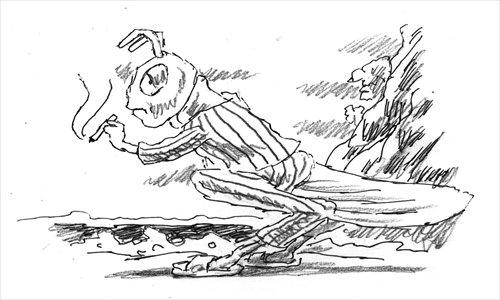
"Thai people are saying Chinese tourists are like locusts," a chubby middle-aged man told a group of fellow Chinese sitting on a beach in Thailand, listening to a local reggae band. He continued, "I agree with them."
He had only moments before gleefully described the sex tourism scene in Pattaya, a sordid beach town near Bangkok. He looked like a government official who had stepped out of a blackmail video.
But what was he doing here?
Tonsai Beach, where we were sitting, is the rock climbing Mecca of Southeast Asia. It is also a center of the stoner arts - firespinning, slacklining and jenga. When someone there picks up a guitar and sings, the chances are they will play a song they wrote themselves, usually about travelling. Almost everyone has tattoos. You can take morning yoga classes. If that's not enough, a Russian couple will hang your body from a tree or stalagmite by flesh hooks. Every evening at dawn, a couple of people parachuted off a cliff onto the beach.
So it came as a surprise when just after sunrise one morning, as I carried my climbing equipment along the shore, I crossed paths with an elderly Chinese man, strolling on the sand in his full-length pajamas and blue plastic flipflops. He of course pretended I wasn't there. One of the survival skills of Chinese people, accustomed to living in crowded conditions, is the ability to tune out other people and act as if they are the only people in the world.
As the Spring Festival holiday drew near, more and more Chinese showed up on Tonsai. They were climbers mostly, but they brought their families with them, sometimes including grandma and grandpa, who would take care of the children while the parents scaled the limestone cliffs that looked like classic pen and ink scenes of mountains and the sea. One grandfather was on crutches. I wondered if he hurt himself climbing out of a wooden boat into the shallow ocean - the only way to get to this beach.
At one cliff by the beach, different groups of Chinese climbers set up ropes on all the best routes. In a violation of the gentlemen's code of lining up for climbs, they simply switched places and rotated through all the routes, a cabal that essentially boxed out the other climbers. This was queue jumping taken to the extreme - a sort of centrally planned rock climbing economy.
The Chinese climbers were friendly in their way, but mostly kept to themselves. This was of course partly due to the language gap, but also the culture gap. At the Boatman restaurant one night, for example, I saw a group of Chinese toasting and drinking shots of the local firewater after a hard day of climbing alongside dredded and pierced Spaniards smoking Bob Marley-sized spliffs.
At the reggae concert on the beach, the chubby man talked about Chinese people driving up prices wherever they went, and buying everything in sight, leaving the shelves of stores empty. He also alluded to the bad behavior of Chinese on vacation, reminding me of the caricature of the "ugly American" tourist that thrived as Americans started to become wealthy enough to travel through Europe in great numbers.
A Chinese girl with a foreign boyfriend passed the group a spliff. To my surprise, an older climber took a drag, saying Navy men would try anything. A few minutes later, everyone was smoking another, with a newly arrived girl from Shanghai taking particularly deep hauls.
The reggae music intensified. The Navy man wondered if a cliff jumper who had crashed into the sand before his chute fully opened would survive. They invited me to join them climbing the next morning. I thought to myself, this beach just might survive the arrival of the Chinese.
